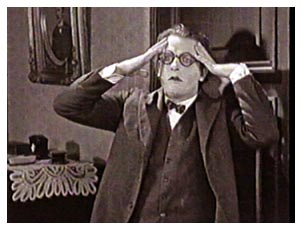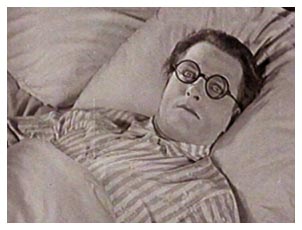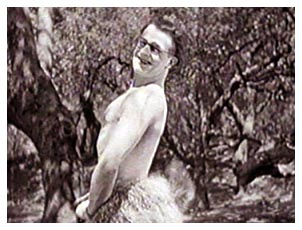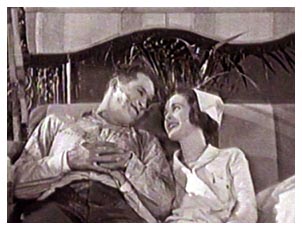

Directed by Harry A. Pollard
Distributed by Universal Pictures, a Universal-Jewel Production
Cast: Reginald Denny (Rufus Billop), Mary Astor (Dolores Hicks),
Otis Harlan (Mr. Clinch), William V. Mong (Mr. McIntosh), Tom
Ricketts (Mr. Peck), Lucille Ward (Aunt Beulah Rush), Mike Donlin
(Buzz Titus), Clarence Geldart (Doctor Seaver), Blanche Payson
(Osteopath), George Kuwa (Chang), Martha Mattox (Death Watch Mary),
Helen Lynch (Maid)
 Rufus Billop is a hypochondriac
convinced he doesn't have much longer to live. He borrows $100,000
from three crazy old men with the promise he will give them his
entire $750,000 inheritance in return when he gets it in three
years. Rufus is convinced he won't live another three years, and
the old men are determined to keep him alive that long, at least.
Rufus uses his money to make life comfortable, and hires a live-in
nurse, the pretty Dolores. However, he falls in love with her
and determines to overcome all of his fears to impress her - fear
of foods (he's afraid of a pork chop), fear of driving cars (he's
never driven, but decides to make one "go" around a
race track), fear of motorcycles and fear of heights (he takes
a job painting a flagpole atop a skyscraper). The three loaners
are terrified of his stunts (two result in accidents), sure that
he'll kill himself, and they will never receive their $750,000.
Dolores is, at first, angry with him for his recklessness, but
understands and encourages when he declares his love and explains
why he must overcome his fears. Of course, it's up to Dolores
to figure out how to get Rufus out of the agreement with the three
old men so he doesn't lose his inheritance.
Rufus Billop is a hypochondriac
convinced he doesn't have much longer to live. He borrows $100,000
from three crazy old men with the promise he will give them his
entire $750,000 inheritance in return when he gets it in three
years. Rufus is convinced he won't live another three years, and
the old men are determined to keep him alive that long, at least.
Rufus uses his money to make life comfortable, and hires a live-in
nurse, the pretty Dolores. However, he falls in love with her
and determines to overcome all of his fears to impress her - fear
of foods (he's afraid of a pork chop), fear of driving cars (he's
never driven, but decides to make one "go" around a
race track), fear of motorcycles and fear of heights (he takes
a job painting a flagpole atop a skyscraper). The three loaners
are terrified of his stunts (two result in accidents), sure that
he'll kill himself, and they will never receive their $750,000.
Dolores is, at first, angry with him for his recklessness, but
understands and encourages when he declares his love and explains
why he must overcome his fears. Of course, it's up to Dolores
to figure out how to get Rufus out of the agreement with the three
old men so he doesn't lose his inheritance.
I like Reginald Denny! With comedy that arises out of situations rather than pratfalls, the humor comes from a grand mix of farcical storylines, well-cast supporting players who supplement the laughs, and just enough silliness to border on the absurd while not quite crossing that line.
Fortunately, several of his starring features are out there for home viewing - "California Straight Ahead" (1925 - and my personal favorite), "Skinner's Dress Suit" (1926 - his most popular comedy), "The Night Bird" (1926) and "The Cheerful Fraud" (1926). All are filled with laughs and a joy to watch. "Oh, Doctor" (1925), the most recent home video release, is another addition to this library of fun-filled films.
According to Kevin Brownlow in The Parade's Gone By (Bonanza Books, 1968), "The stories of the Denny comedies presented in print, suggest pure farce, or the most contrived situation comedies. But Denny enjoyed taking the most extravagant, absurd, and impossible situation and playing it realistically."
And this very appropriately describes "Oh, Doctor!" Denny portrays an effeminate mollycoddle and hypochondriac with complete believability - quite an accomplishment for someone who won the brigade heavyweight boxing championship when he was in the Royal Flying Corps. Nevertheless, he's a very funny Rufus Billop, convinced he's going to die, afraid of everything, and armed with a suitcase full of medication. He's even afraid of the dog, and runs in terror when the canine begins barking - straight for his stash of medicine. He takes Nerve Restorer, Milk with Pepsin and a variety of other tonics to calm his nerves.
Denny was a handsome guy who could play leading roles with the likes of Laura La Plante or Gertrude Olmsted very convincingly. However, someone came up with an idea that, very simply, gave a different look to the Reginald Denny we have come to know - and that was a lengthening of the hair in the back. Sure, as one would expect, the tortoiseshell glasses are there, but the difference in the hair helped Denny step outside the debonair - albeit bungling - character we are so used to - a very fitting touch to the character.
The story revolves around an inheritance Rufus is to receive in three years - although he's convinced he won't live another three years to see it. Because of his fears, his doctor recommends he go to a sanitarium for a rest, but Rufus says he can't afford it. Doc suggests he borrow some money to provide him a more comfortable existence. But no one is crazy enough to loan a dying man money, Rufus insists. Ah! Not so! Doc says he knows three "crazy" men who will - and thus enter three of the funniest characters ever put on film - Clinch (Otis Harlan), McIntosh (William V. Mong) and Peck (Thomas Ricketts) - three old geezers who run a loan company. A title follows their introduction that states, "But not so crazy that they would advance real money until after a careful examination by specialists."
Of course, the specialists find nothing wrong with Rufus, and the deal is cut - he gets $100,000, and, in return, at the end of three years (if he lives), Clinch, McIntosh and Peck get the entire $750,000 inheritance.
Throughout the film, the three men are in mortal terror
their "investment" may die or do something to get killed.
Each time they are under stress, Clinch walks the floor in a triangle,
McIntosh  tears newspaper into strips, and
Peck has a nervous habit of wrapping the handle of his cane around
the back of his neck and pulling on it. By the way, Otis Harlan
is a greatly underrated comedian. His nervous mannerisms, twiddling
of fingers, wide-eyed stare, rocking back and forth and chewing
his cigar apart are priceless! He is truly fun to watch in this
film.
tears newspaper into strips, and
Peck has a nervous habit of wrapping the handle of his cane around
the back of his neck and pulling on it. By the way, Otis Harlan
is a greatly underrated comedian. His nervous mannerisms, twiddling
of fingers, wide-eyed stare, rocking back and forth and chewing
his cigar apart are priceless! He is truly fun to watch in this
film.
When he gets the money, Rufus sets up the ideal restful environment in his home - comfortable bed and room, all the medications he could possibly want, and a private nurse . . . frighteningly nicknamed "Death Watch Mary." Classically played by Martha Mattox, her somber face fits the character perfectly. It appears Mary actually enjoys having a job where she can watch someone die - even to the point of questioning any positive signs of good health. For example, she takes Rufus' temperature, looks at the thermometer, and says, "Hm! Temperature normal! Something wrong with the thermometer."
When Clinch, McIntosh and Peck come to check on Rufus, Death Watch Mary tells them gloomily, "It may be days or weeks. . . I wouldn't say, but . . ." Then, in a panic, the three men run to Rufus' doctor. We see a shot of them running down the street - but what's so funny is Peck requires a cane to walk, and he's leading the pack!
An example of the excellent title writing comes next. They tell the doctor, "He's dying!" "Who's dying?" the doctor asks. "Rufus - and seven hundred fifty thousand dollars!" they respond. Good title-writing is evident throughout the film and, without resorting to "corny" humor, the intertitles bring laughs that are natural.
When the doctor learns "Death Watch Mary" is the nurse, he exclaims, "Good Lord, she'll have him in his grave in two weeks!" The three men are in a dither - what should they do? Clinch has an idea. Rufus needs a younger nurse - a "lovely view." The Doc knows just the girl - enter Mary Astor as nurse Dolores Hicks.
Astor's part is not played for humor, nor should it be.
Actually, her character is very reserved, and, in her first encounter
with him, her face exhibits quiet contempt. She knows there's
nothing  wrong with him. However, when Rufus
sees her, he suddenly perks up. Not only is his wide-eyed surprise
through those large glasses priceless, we see his pajama top move
up and down as his heart beats rapidly - not the most original
joke, but very effective here.
wrong with him. However, when Rufus
sees her, he suddenly perks up. Not only is his wide-eyed surprise
through those large glasses priceless, we see his pajama top move
up and down as his heart beats rapidly - not the most original
joke, but very effective here.
Hilarious scenes continue to follow in this story as Rufus - with the silliest of grins on his face - stares at a picture of a faun and a girl on the wall imagining the figures in the painting are he and Dolores. The scene fades, and there is Denny, bare-chested, but with the most ridiculous pair of fur pants on that come just below the knees to give the "faun" appearance - flute in hand and still wearing those tortoiseshell glasses. Mary, in her nurse's uniform, dances around the meadow with a long, flowing chiffon (?) streamer trailing through the air as she dances about. Then we see Rufus turn sideways and look over at Dolores with a giddy smile on his face and - don't miss this - the nub of a tail on the back of the fur pants is wagging back and forth as if there's a high speed motor attached. Priceless!
Now anxious to win Dolores' favor, he is told by the maid that girls are impressed by cars - so he goes out and buys a new car. But that's not enough. He enlists the help of Buzz Titus. When Clinch finds out about Buzz, he once again goes into his nervous panic mode. "He's the speed maniac that smashed up four cars and killed two people in one month!" Clinch exclaims. And, sure enough, Rufus isn't content to drive the car (something he's never done before). He wants to take the car to the race track and "make her go!" As expected, he crashes, and it's up to Dolores to nurse his injuries (although not serious).
However, in spite of his first mishap, it doesn't stop him from facing his next fear. He and Buzz get a motorcycle and take it out for a ride around the city streets. You guessed it. He crashes the motorcycle and comes home cut, bruised, muddy, limping and generally banged up. When he arrives at the gate of the courtyard, Dolores sees him. Denny's portrayal of a hurting man insisting he is fine is classic - not only does he look like a train wreck, he's wobbling as he tries to stand erect and act if he's alright - but it's obvious to us and Dolores that he is in much pain.
This is where the storyline reveals some depth. He approaches (actually limps toward) Dolores, but she is angry - so angry she berates Rufus fiercely with tears in her eyes then, in hopeless despair, falls to the chair, turns and places her face in the crook of her arm and cries. Rufus suddenly becomes a passionate comforter and, without thinking, kisses her back as he strokes her arm - then, realizing what he has done, he jerks back suddenly. Not only is his affection for Dolores evident, we now realize that Dolore's anger is the result of her love for Rufus.
Brushing away her tears, she turns to him and asks, "Why
do you do such things?" Then from this bumbling hypochondriac
who has been difficult to take seriously up to this point, come
the  words, "Because I'm afraid."
The tenor of the entire story now changes - very appropriately
so, and not in a sappy way. "All my life I've been afraid
of everything - dogs, automobiles . . . and when you came, I was
ashamed. That's why I've got to do these things I'm afraid of."
words, "Because I'm afraid."
The tenor of the entire story now changes - very appropriately
so, and not in a sappy way. "All my life I've been afraid
of everything - dogs, automobiles . . . and when you came, I was
ashamed. That's why I've got to do these things I'm afraid of."
Of course, Dolores understands, says she's proud of him, and - to our surprise - says she will support him in whatever he'd like to do.
So now we realize that these rash actions were not just to impress a girl - Rufus had something to prove to himself, as well - and our story now moves to a deeper level.
Of course, there must be at least one more challenge for Rufus to face - and he is determined he must conquer his fear of heights. How? He decides to take a job advertised in the newspaper as a flagpole painter. But, wait! The flagpole is on top of one of the highest buildings in the city! What's more, the building belongs to Peck, so you can imagine the reaction when the three loan men find out what Rufus is up to! Needless to say, the final minutes of this narrative contain thrills such as we would expect to find in a Harold Lloyd film. And what adds to the suspense is that Peck orders the flagpole taken down thinking he can prevent Rufus from following through on this death-defying stunt. However, the pole must be unbolted from beneath the roof level, and the workmen don't realize that Rufus is high atop the pole with a paint bucket just as they are dismantling it!! Great fun!
It's no surprise that this film received universal praise. The New York Times (Feb. 18, 1925) called it a "wonderfully funny comedy," adding "Universal Pictures Corporation are entitled to great praise for this engaging and thoroughly pleasing comedy, which is an excellent entertainment for young and old." Variety (Feb. 25, 1925) said, "'Oh, Doctor' compares with the best in screen farce," while Harrison's Reports (Nov. 22, 1924) said, "An excellent farce-comedy; it contains a wealth of clean comedy that continually brings hearty laughs from the spectator."
All agreed, too, that the trio of Harlan, Mong and Ricketts complement Denny's hilarious portrayal well. Variety said, "Much footage is given to these boys, and not an inch is wasted," and the viewer will agree that every moment of screen time given to these three veterans just means we have more laughs to enjoy.
And, of course, Mary Astor - at a tender 19 years of age - is most charming as the nurse who falls in love with the extremely eccentric Rufus Billop. When she first encounters Rufus, it's almost as if she has a quizzical look on her face - trying to determine if this guy's truly ill or a nut. Later, as it becomes evident there is nothing wrong with him (the doctor tells her to give him pills made from bread), her stern look carries a mild contempt because of his constant need for pampering. And, when we finally realize she's upset at his daring feats because she loves him, the strength of character we've seen gives way to a tender heart that is filled with a fear he will die attempting these foolish stunts. The New York Times reservedly gave glowing reviews to actors, particularly in second echelon comedies such as this; however, the writer noted, "The casting of this picture has been done with care. It is most important to the story, for it would never do to have an uninteresting if capable actress in the part of Dolores Hicks. This role calls for a pretty, as well as an efficient, player, and nobody could have filled it better than does Mary Astor, who had never looked as charming as she does in a nurse's costume in this comedy." Variety added, "Mary Astor in support is a good-looking girl who does her acting chores well . . ."
Not enough can be said about Reginald Denny. He has scored again with "Oh, Doctor!" and, proven that his character is not one-dimensional, as Rufus Billop is a complete variation on characters such as Tom Hayden in "California Straight Ahead," Skinner in "Skinner's Dress Suit" or Sir Michael Fairlie in "The Cheerful Fraud." Harrison's Reports said Denny is perfect for the role. "Reginald Denny has a new type of role - that of a mollycoddle - and no one could have handled it more successfully than he has done." Variety said, "In Reginald Denny Universal has a star whose recent stuff has been riotously funny. . . Here his performance is first rate. Aided as it is by one of the best farces ever transferred to the screen, it looks like a pipe to go out and clean up."
As noted earlier, there are several of his comedies available for home viewing, and they are all good. He was able to play roles such as this as the all-American go-getter - with a more subtle, situation-based humor than Harold Lloyd - and with great success in the silent era. However, when sound came in, his English accent led to a totally different, albeit successful, career in supporting roles. According to Brownlow, "Denny's attributes as a comedian seem much higher in retrospect than they appeared at the time. The twenties, of course, were a golden age: with Chaplin, Keaton, Lloyd, and later, Langdon, occupying the highest echelons, other comedians suffered by comparison. Denny's style, however, was individual enough to withstand such searing competition . . . his talents are impressive enough for him to be placed, with Raymond Griffith, on a level only slightly below that of the masters." And most importantly - and understandably - his popularity with the public was among the highest. In a 1924 Film Daily popularity poll, he tied for eighth with Colleen Moore and Mary Pickford, rather respectable company. Only one comedian ranked higher - Harold Lloyd who claimed the number one spot.
Jack Hardy at Grapevine Video (www.grapevinevideo.com) is to be commended for another fine release. The quality is better than average with good contrast through most of the film. There are the ubiquitous white scratches throughout, but the overall quality is pleasing to the eye, and none of the faults detract from the enjoyment of the story. The film appears to be complete according to the length listed in the American Film Institute Catalog, although there is no explanation of the source of the $750,000 inheritance. An original theatre organ score by David Knudtson makes for a most enjoyable viewing experience - and, by the way, for those of you who have surround sound systems - you'll hear the organ score envelope the room through all speakers - not true 5.1 surround sound - but better than you get from most films from the first 30 years of the sound era which produce two-channel sound through front speakers only.
Copyright 2011 by Tim Lussier. All rights reserved.